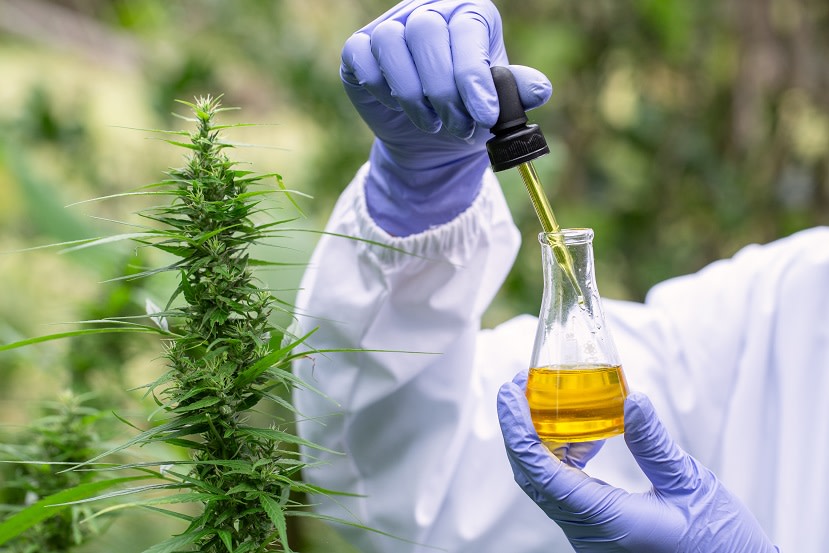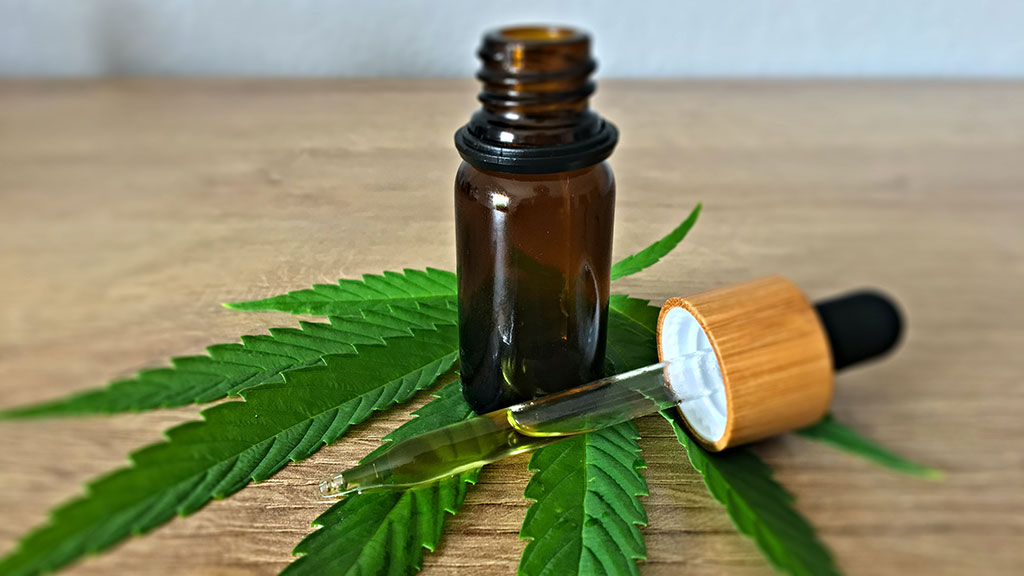Introduction
In the ever-evolving landscape of wellness and alternative medicine, CBD and THC have emerged as notable players, each offering distinct properties and potential health benefits. While they originate from the same cannabis plant, their effects and applications diverge significantly.

This article delves into the fundamental disparities between CBD (cannabidiol) and THC (tetrahydrocannabinol), shedding light on their respective advantages, and how individuals can harness them for various health-related purposes. Understanding these differences is essential for making informed choices in pursuit of improved well-being.
CBD vs. THC: The Basics
CBD (Cannabidiol)
CBD is one of over 100 cannabinoids found in the cannabis plant, but it stands out for its non-psychoactive properties. Unlike THC, CBD does not produce the “high” associated with cannabis use. It interacts with the endocannabinoid system (ECS) in the body, a complex network of receptors that play a role in regulating various bodily functions, including mood, pain perception, and immune response.
THC (Tetrahydrocannabinol)
THC, on the other hand, is the primary psychoactive compound in cannabis. It binds to cannabinoid receptors in the brain, leading to the euphoric and psychoactive effects commonly associated with marijuana use. These effects can vary depending on the strain and dosage consumed.
Key Differences
- Psychoactive vs. Non-Psychoactive: The most significant difference between CBD and THC is their psych activity. THC induces a “high” when consumed, whereas CBD does not alter one’s mental state.
- Legality: While CBD derived from industrial hemp (containing less than 0.3% THC) is legal in many countries, THC remains illegal in most places due to its psychoactive properties.
- Medical Applications: CBD has gained recognition for its potential therapeutic benefits, while THC’s primary use is for recreational purposes. However, THC does have medical applications, especially in pain management and nausea relief.

Benefits of CBD
- Pain Relief: CBD has shown promise in alleviating chronic pain by interacting with the ECS to reduce inflammation and pain perception. It is used to manage conditions like arthritis, multiple sclerosis, and fibromyalgia.
- Anxiety and Depression: Many individuals turn to CBD to manage anxiety and depression. It interacts with serotonin receptors in the brain, which may help improve mood and reduce anxiety symptoms.
- Epilepsy: Epidiolex, a CBD-based medication, has been approved by the FDA for the treatment of two rare forms of epilepsy, Lennox-Gastaut syndrome and Dravet syndrome. It has shown significant efficacy in reducing seizure frequency.
- Neuroprotective Properties: CBD’s neuroprotective qualities make it a potential candidate for treating neurodegenerative diseases like Alzheimer’s and Parkinson’s disease. It may help reduce oxidative stress and inflammation in the brain.
- Anti-Inflammatory: CBD’s anti-inflammatory properties can benefit various conditions, such as inflammatory bowel disease (IBD) and acne. By reducing inflammation, it may alleviate symptoms and improve overall health.
Benefits of THC
- Pain Management: THC is a potent analgesic and is often used for pain relief, especially in conditions where other treatments have been ineffective. It can be particularly helpful for cancer-related pain and neuropathic pain.
- Nausea and Vomiting: THC has long been used to alleviate nausea and vomiting, often in cancer patients undergoing chemotherapy. Some pharmaceutical drugs containing THC (e.g., Marinol) are approved for this purpose.
- Appetite Stimulation: THC is known to stimulate appetite, which can be beneficial for individuals experiencing appetite loss due to medical conditions like HIV/AIDS and certain eating disorders.
- Glaucoma: THC has demonstrated its ability to lower intraocular pressure, making it a potential treatment for glaucoma, a condition that can lead to vision loss.
- Muscle Spasms: Some patients with conditions like multiple sclerosis (MS) find relief from muscle spasms and spasticity through the use of THC-based medications.
Combining CBD and THC: The Entourage Effect
In some cases, the combination of CBD and THC can be more effective than using each compound individually. This phenomenon is known as the “entourage effect.” When used together, these compounds may enhance each other’s therapeutic properties while mitigating potential side effects. For example, some medical cannabis strains have a balanced ratio of CBD to THC to maximize therapeutic benefits.
Safety and Side Effects
Both CBD and THC are generally considered safe when used responsibly. However, they can cause side effects, which may include:
CBD Side Effects:
- Dry mouth
- Diarrhea
- Changes in appetite and weight
- Fatigue
THC Side Effects:
- Impaired coordination and concentration
- Increased heart rate
- Anxiety or paranoia (especially in high doses)
- Memory and cognitive issues (especially with long-term use)
It’s important to start with low doses, especially when using THC, to minimize the risk of adverse effects. Consultation with a healthcare professional is advised, particularly if you are pregnant, nursing, or have preexisting medical conditions.
Using CBD and THC Responsibly
When considering the use of CBD or THC, it’s essential to approach them responsibly. Here are some tips for using these compounds safely and effectively:
- Start Low and Go Slow: Whether you’re using CBD or THC, it’s advisable to begin with a low dose and gradually increase it as needed. This approach minimizes the risk of adverse effects and allows you to find the right dosage for your specific needs.
- Consult a Healthcare Professional: Before incorporating CBD or THC into your wellness routine, consult with a healthcare professional, especially if you have underlying medical conditions or are taking other medications. They can provide guidance on dosage, potential interactions, and safety precautions.
- Choose Quality Products: Ensure that you purchase CBD and THC products from reputable sources. Look for products that have been third-party tested for purity and potency. This helps you verify the product’s contents and ensure it meets safety standards.
- Be Mindful of Legal Regulations: Familiarize yourself with the legal status of CBD and THC in your region. Laws regarding cannabis and its derivatives vary widely, so it’s essential to stay informed to avoid legal issues.
- Consider the Form of Consumption: CBD and THC come in various forms, including oils, capsules, edibles, topicals, and more. Choose a delivery method that suits your preferences and desired effects. For example, if you’re seeking rapid relief, inhalation methods like vaping may be more suitable.
- Monitor Your Body’s Response: Pay close attention to how your body responds to CBD or THC. Keep a journal to track the effects, dosage, and any side effects you may experience. This information can help you make informed adjustments to your regimen.
- Be Patient: The effects of CBD and THC can vary from person to person. It may take time to find the right product and dosage that works best for you. Patience is key to optimizing your experience.
The Future of CBD and THC Research
The growing interest in CBD and THC has fueled extensive research into their potential benefits and applications. As the legal and scientific landscape continues to evolve, we can expect to see more discoveries and innovations in this field. Some areas of ongoing research include:
- Cannabis-Based Medications: Pharmaceutical companies are exploring the development of medications containing specific ratios of CBD and THC for various medical conditions, such as pain, epilepsy, and psychiatric disorders.
- Cannabis and Mental Health: Researchers are investigating the impact of CBD and THC on mental health conditions like anxiety, depression, and post-traumatic stress disorder (PTSD). This research may lead to new treatment options.
- Neurological Disorders: CBD and THC are being studied for their potential in treating neurological disorders, including Alzheimer’s disease, Parkinson’s disease, and multiple sclerosis. These compounds may offer novel approaches to managing these conditions.
- Cannabis and Cancer: There is ongoing research into the use of cannabinoids for cancer treatment and symptom management. Some studies suggest that CBD and THC may have anti-tumor properties and could complement traditional cancer therapies.
Conclusion
CBD and THC, though originating from the same plant, have distinct properties and offer unique benefits. CBD is celebrated for its non-psychoactive nature and versatility in addressing various health concerns, from pain management to anxiety relief. On the other hand, THC is valued for its potent analgesic and anti-nausea properties.
Understanding the differences between CBD and THC is crucial for making informed choices about their usage. Depending on your specific health needs and legal restrictions in your area, you may choose one or the other, or a combination of both to harness the entourage effect. Always consult with a healthcare professional before incorporating these compounds into your wellness routine to ensure safe and effective usage. With the right guidance, CBD and THC can potentially enhance your overall well-being and quality of life
